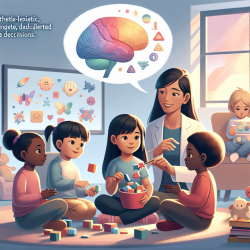Empowering Change: Lessons from Afghanistan's Humanitarian Crisis for Speech-Language Pathologists
In the realm of speech-language pathology, the pursuit of optimal outcomes for children often requires us to look beyond our immediate environment and learn from global events. The recent research article, "Addressing the humanitarian crisis in Afghanistan through $10 billion Afghani assets: what are the challenges and opportunities at hand?" provides profound insights that can be translated into our field to enhance our practice and advocacy efforts.
Understanding the Context
The humanitarian crisis in Afghanistan, exacerbated by the freezing of $10 billion in assets, presents a complex scenario where international oversight and strategic fund allocation are critical. The research emphasizes the importance of transparent fund management to support healthcare, education, and economic stability in Afghanistan. These themes resonate with our mission to support children's development through informed and ethical practices.
Implementing Lessons in Speech-Language Pathology
As practitioners, we can draw parallels between the strategic allocation of resources in Afghanistan and our approach to therapy. Here are some actionable insights:
- Data-Driven Decisions: Just as the article stresses the need for oversight and data in fund allocation, we must rely on data to inform our therapeutic interventions. Regular assessments and progress tracking ensure that our therapy is effective and tailored to each child's needs.
- Collaborative Efforts: The success of international organizations in Afghanistan hinges on collaboration. Similarly, we should engage with educators, parents, and other professionals to create a holistic support system for children.
- Resource Allocation: The efficient use of resources in Afghanistan can inspire us to optimize our therapeutic materials and tools, ensuring they are used effectively to maximize children's learning opportunities.
Encouraging Further Research
The article highlights the importance of long-term planning and sustainable solutions. In our field, this translates to ongoing research and professional development. By staying informed about the latest evidence-based practices, we can continuously refine our approaches and advocate for policies that support children's communication needs.
Conclusion
The humanitarian crisis in Afghanistan serves as a poignant reminder of the global interconnectedness of health, education, and economic stability. As speech-language pathologists, we have the opportunity to learn from these challenges and apply these lessons to improve outcomes for the children we serve. By embracing data-driven decisions, fostering collaboration, and advocating for sustainable practices, we can empower change in our communities.
To read the original research paper, please follow this link: Addressing the humanitarian crisis in Afghanistan through $10 billion Afghani assets: what are the challenges and opportunities at hand?










